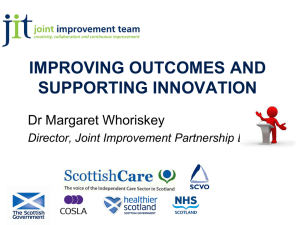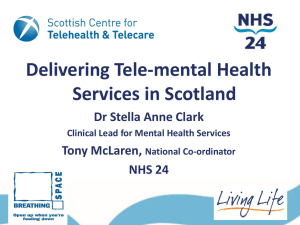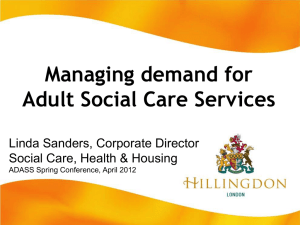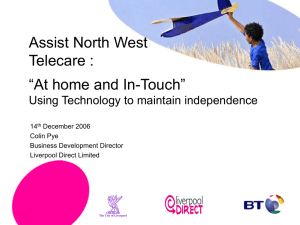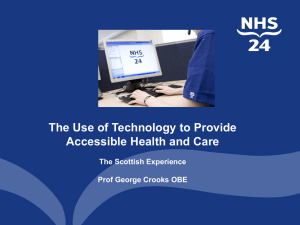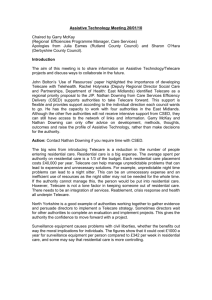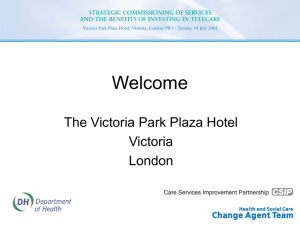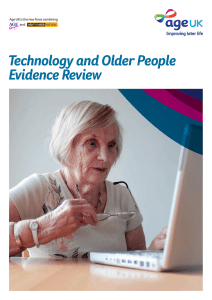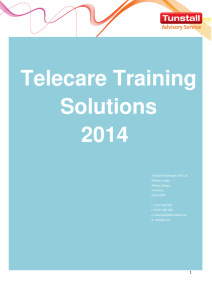John Bolton, Derek Law
advertisement
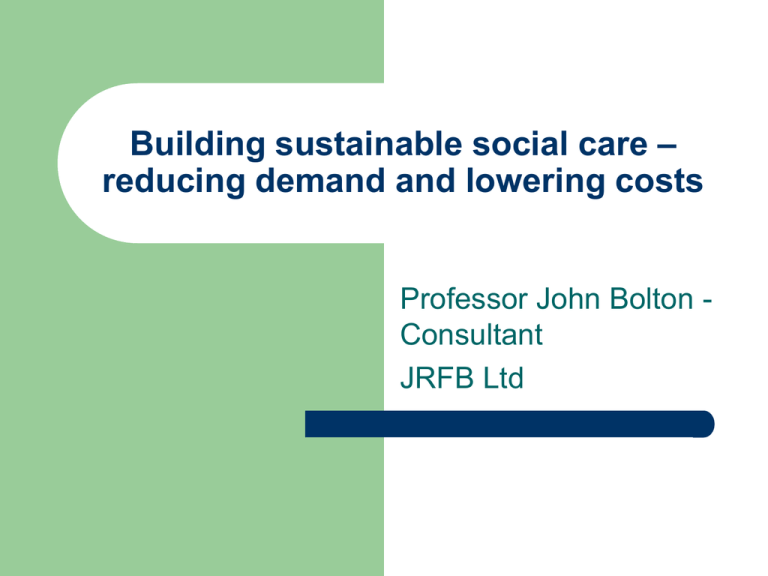
Building sustainable social care – reducing demand and lowering costs Professor John Bolton Consultant JRFB Ltd Ways to save money in Adult Social Care – England and Wales Reducing demand for services Reducing demand for domiciliary care Reablement Reviews Reducing demand for residential care Intermediate Care and Health based solutions Driving down costs The Resource Allocation Process Direct Payments Lean Processes Mobile and remote working Electronic Care Records IT solutions Models of care delivery Housing based solution including Extra Care Housing and solutions for Younger Adults Commissioning for better outcomes Telecare and Telehealth Children’s Transitions Externalising services Procurement Adult Placement Schemes Further ways to save money in England and Wales Raising monies Citizens Contributions Continuing Health Care Partnership working Health Shared costs Falls prevention Diverting people away from social care Screening Other partnerships Stricter eligibility Day Care future Employment and Training Customer Contact Better management Reviewing staffing numbers and structures Skills mix and Job Carving Tackling sickness levels Admissions to residential care from hospital NHS nursing/group/residential care home Non-NHS (not local auth) Res Care Home Episodes ending between 1/1/2009 and 31/12/2009 by Welsh Local Health Boards to Local Authority Areas 170 480 500 360 30 150 60 110 20 400 50 250 50 20 50 0 90 190 150 60 90 20 90 10 120 20 120 130 20 70 120 270 130 140 20 160 20 20 30 130 50 0 30 30 Vale of Glamorgan – improved discharges At a cost to the PCT – increased nursing home admissions Telecare and telehealth Positive noises from whole system demonstrator sites Hard to identify “savings” because intrinsic to approach to lowering demand – but business case can be made – North Yorkshire Investments and Partnerships – Birmingham Could be part of the joint solution with NHS For more help………. Professor John Bolton Independent Consultant 07789748166 john.bolton@jrfb.co.uk Derek Law. MBE Corporate Director, North Yorkshire County Council Telecare – Part of our Care Market Solution Our Basic Budget Strategy. Downward Extra Care pressure on Residential Care Admissions Increase Support More People Reablement Domiciliary Care Hours More early Intervention via 3rd Sector Increase use of Assistive Technology We have over 12,000 using lifelines, 3346 have had access to telecare and each team has a monthly target to increase usage. Cumulative total of Telecare Services Started April 10 - February 2011 (new people w ho did not have a Telecare service prior to 010410) 300 250 HC Started 200 HR Started Selby Started 150 SWR Started Average 100 Target 50 0 April May June July August September October November December January February HC Started 13 23 31 54 73 97 126 173 190 203 220 HR Started 14 35 65 96 113 129 146 188 211 230 239 Selby Started 9 18 25 38 60 73 86 104 119 133 142 SWR Started 17 30 47 64 76 89 111 140 157 164 175 Average 13.25 26.5 42 63 80.5 97 117.25 151.25 169.25 182.5 194 Target 16.67 33.34 50.01 66.68 83.35 100.02 116.69 133.36 150.03 166.7 183.37 We set ourselves a 10% increase at the beginning of the year. We are achieving on average a 14% increase ! Outcomes and achievements • Between April 09 – Now – some 5000 multi-agency attendees at awareness, PR and installation training sessions. – The approach is assisting staff to manage risks when providing customised services. – People speak of how the service has helped them to carry on living at home give more confidence/peace of mind, feel safer. – All staff in social care have received awareness training, with new staff targeted soon after arrival. It is embedded as part of our reablement programme. – The County has created a training pack and guidelines for fitting equipment and developed Long Term Conditions pathways for a range of conditions with PCT. – LD providers now beginning to embed personalised technology as part of support. – Short stay residents to EPH’s offered Telecare to use in EPH and take home. – Telecare tested and piloted in home for people with dementia and demonstrated improved outcomes for residents and staff. ( St Celia’s) The Finance Case • We have an ongoing process of evaluation: – Care managers identify what people’s traditional care package would have been if Telecare had not available, and what the actual Telecare enhanced packages of care were. – 46% traditional packages would have been residential, EMI or nursing. – 54% traditional packages would have been care at home. – If existing homecare is >10 hrs, the trends indicated homecare reduced, but still an element of care. – If the traditional package was <7 hours, the trend was home care hrs reduced or not have to be provided at all. – Analysis indicated a net average efficiency/person on annual basis at £3,654 – – a 38% reduction in care package costs. • The DH and CSED have now taken NYCC model and expanded it as a national evaluation tool. See the SCED website. Case Studies • Numerous! • Tell the story ..we have numerous case studies … they capture minds and hearts. • How people are in control • Personalisation. • This is both a finance story and more importantly one of people being more in control of their own lives. Thank You A Range of videos, case studies, reports and other resources are freely available at: http://www.northyorks.gov.uk/telecare Derek Law MBE Corporate Director Making Telecare Happen Fast!! Linda Sanders Director of Social Care, Health & Housing London Borough of Hillingdon Change of scene • Previously Director in Dudley – Developed an effective Telecare service in the Borough over a number of years – Recently accelerated this development with Tunstall’s assistance • Moved to new job in Hillingdon – Telecare under-developed – “Marginal” service – OPPORTUNITY!!! Better outcomes, save money!!! Making it Happen • Plan has 4 key elements:– Business Case – Leadership approach – Ensuring local services are “Fit for purpose” – “Winning over” the front line staff Making it Happen • Business Plan – – – – Developed by Finance team Foresees a net £4m+ saving over 4 years, (£805k first year) Need to save 80 residential care weeks to breakeven, (year 1) Delivers 3,000 Telecare users • Leadership – – – – Council and SMT on board Clear, strong message about the vision Appropriate Performance Management put in “Partner Plan” put in place to ensure third sector, independent sector and citizen voice organisations are also on board Making it Happen • Local services “fit for purpose”? – Good basis in place with existing service – Made sure that capacity to meet demand was properly planned • “Winning over the Front Line” – Training, training, training!!! – Win over “hearts and minds”, NOT about the technology – A little bit of “stick”!! • Team targets for referrals • You need a reason WHY NOT to include Telecare Making it Happen • A couple of other key things:– Assigned clear delivery responsibility to Assistant Director in order to ensure that the work is done – Hired a project manager to drive implementation, (part time) – Work closely with the Telecare supplier Thank you very much for listening!!

